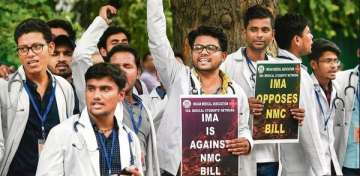Amid the protests, the Union Health Minister Harsh Vardhan introduced the National Medical Council (NMC) Bill in Lok Sabha on Monday. Once this bill is enacted the Indian Medical Council Act, 1956 will become null and void and will put the future of medical education at stake. Currently, the Medical Council of India is the regulator of medical education of the country.
Why the current MCI is being replaced?
In 2016, the Parliamentary Standing Committee on Health and Welfare said that the Medical Council of India has failed to fulfil its responsibilities of producing Competent doctors, maintaining quality standards etc. The report also stated that the quality of medical education is at its lowest ebb and found that the current model of medical education is not producing the right type of health professionals that meet the basic health needs of the country. There are instances in which many of the doctors coming out of medical colleges are ill-prepared to serve in poor resource settings like Primary Health Centre and even at the district level. It has also been found that some medical graduates lack competence in performing basic health care tasks like conducting normal deliveries and there also instances of unethical practice continue to grow due to which respect for the profession has dwindled.
What is the National Medical Council (NMC) Bill, 2019?
The bill will set up the National Medical Commission which will regulate the medical education and practice in India. The Committee will comprise of 25 members and two-third of them will be medical practitioners. Under the supervision of NMC, there will be four autonomous boards: Under Graduate Education Board, Post Graduate Education Board, The Medical Assessment and Rating Board and The Ethics and Medical Registration Board. The bill will also ensure that the National Eligibility cum Entrance Test is conducted in a uniform manner and there will be a National Licentiate Examination for the doctors to obtain a license to practice after graduation. The bill also empowers the NMC to fix norms for regulating fees for a proportion of seats, not exceeding 40% of the total seats, in private medical institutions. For the rest of the seats, the institutions are free to charge the fees that they may deem appropriate as per their requirements.
The four autonomous Boards under the NMC
What are the major changes in the bill?
After the recommendations of the Parliamentary Standing Committee on Health and Family Welfare, there are two major changes; first, it has dropped a separate exit examination and second, it has dropped the provision that allowed practitioners of homoeopathy and Indian systems of medicine to prescribe allopathy medicines after a bridge course.
What is this "contentious" bridge course?
This bridge course which is stated in clause 32 of the bill is being hotly debated and even some of the MPs of the ruling party also stepped in to criticise it. This clause provides for rights of persons to have a licence to practice and to be enrolled in National Register or State Register. A person who qualifies National Licentiate Examination shall be enrolled in the National Register or State Register.
"The Bill provides for holding of a joint sitting of the Commission, the Central Council of Homeopathy and the Central Council of Indian Medicine to enhance the interface between Homeopathy, Indian systems of medicine and modern systems of medicine. There is also a provision for specific bridge courses that may be introduced for the practitioners of AYUSH to enable them to prescribe such modern medicines at such level as may be approved."
What are the changes in the Exit Exam?
In 2018, the Committee recommended that the final year MBBS examination will be conducted as the licentiate examination.
After detailed deliberations, the Committee came to the conclusion that Clause 32(1) the words any person who qualifies the National Licentiate Examination, as mentioned in line 45 (page 14 of the Bill) may be substituted by the words any person who qualifies the final year MBBS examination. The Committee, accordingly, recommends to re-draft the Clause so as to make the final year MBBS examination as the licentiate examination.
RELATED VIDEO | NMC Bill: AIIMS resident doctors will continue indefinite strike on Friday
